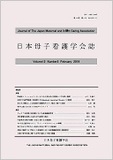Japanese
English
- 有料閲覧
- Abstract 文献概要
- 参考文献 Reference
要旨
目的
2011年3月11日に発生した東日本大震災および東京電力福島第一原子力発電所事故による福島県の避難者は、2012年5月時点で約16万人に上り、その後徐々に減少したものの、2018年4月現在でも約5万人が避難生活を続けている。本研究は、平成24(2012)年度妊産婦に関する調査のデータを用いて、妊産婦の避難生活の実態とうつ傾向との関連を明らかにし、支援に関する示唆を得ることを目的とした。
対象と方法
2011年8月1日から2012年7月31日までに福島県内で母子手帳を交付された者、または福島県内で妊婦健診を受診し分娩した14,516人に対し、2012年度県民健康調査「妊産婦に関する調査」の自記式調査票を郵送し、7,181人(49.5%)から回答が得られた。そのうち、流産、中絶、死産、県外で母子健康手帳の交付を受けた里帰り分娩者、無効回答を除く6,925名を分析対象とした。
結果
対象者の平均出産時年齢は30.4±5.0歳、初産47.6%であった。家族構成は核家族が65.1%で、「現在避難中」が7.7%、「避難経験ありで現在は自宅」が38.9%であった。「避難区域内」の母親は「避難区域外」の母親に比べて、うつ傾向が有意に高く、「現在も避難中」の母親は、「避難なし」の母親と比べてうつ傾向が有意に高かった。さらに、現在避難中で家族と別居をしており、家族とコミュニケーションがとれていると回答しなかった母親にうつ傾向が高いこと、特に核家族において、コミュニケーションがとれていると回答しなかった母親にうつ傾向が有意に高かった。
結論
避難経験の有無よりも、現在避難中であるかどうかが母親の精神状況において重要であり、避難区域内の母親や避難中の母親に対してより精神的な支援が必要である。また、現在避難中、特に核家族の避難中の母親に対し、家族、特にパートナーとのコミュニケーションが取れるように細やかな支援が必要であることが示唆された。
Purpose
The Great East Japan Earthquake of 11 March 2011 and the resulting Fukushima Daiichi Nuclear Power Plant disaster forced massive evacuations in Fukushima Prefecture. In May 2012, the number of evacuees exceeded 160,000. Although this number has since gradually declined, approximately 50,000 people were still living as evacuees as of April 2018. Using data from the Pregnancy and Birth Survey of the FY2012 Fukushima Health Management Survey, this study investigated the association between the lives of evacuated mothers and depressive tendencies, and sought to make recommendations regarding their support.
Methods
A self-administered questionnaire was mailed to 14,516 women who had received a Maternity Handbook or given birth in Fukushima Prefecture between 1 August 2011 and 31 July 2012; responses were obtained from 7,181 women (49.5%). After excluding women whose pregnancies ended in miscarriage, abortion, or stillbirth; women who returned to give birth in Fukushima but had received their Maternity Handbooks in other prefectures; and invalid responses, this analysis included 6,925 valid responses.
Results
Of the subjects, (mean age 30.4±5.0 years), 47.6% were primiparas, 65.1% lived in a nuclear family, 7.7% were living as evacuees, and 38.9% had previously lived as evacuees but were living at home as of the time of the survey. Mothers in the evacuation zone demonstrated significantly higher depressive tendencies than mothers outside the zone, and mothers living as evacuees demonstrated significantly higher depressive tendencies than mothers not living as evacuees. Depressive tendencies were also high among evacuated mothers who were living apart from their families and unable to communicate with them. In particular, nuclear family mothers who responded that they were unable to communicate with their families demonstrated significantly high depressive tendencies.
Conclusions
These results indicate that whether a mother is currently living as an evacuee affects their mental state more than whether they have ever lived as an evacuee in the past. In addition, mothers living in the evacuation zone and living as evacuees seemed to require more mental health support. Also, mothers living as evacuees, particularly those separated from their nuclear families, were indicated to require more detailed support to enable them to communicate with their families, particularly their partners.
Copyright © 2019, The Japan Maternal and Infant Caring Association All rights reserved.


